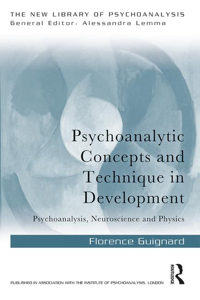The Couch in the Marketplace: Psychoanalysis and Social Reality

Book Details
- Publisher : Routledge
- Published : July 2013
- Cover : Paperback
- Pages : 200
- Category :
Psychotherapy and Politics - Category 2 :
Psychoanalysis - Catalogue No : 34227
- ISBN 13 : 9781782200307
- ISBN 10 : 1782200304
Also by H. Shmuel Erlich
Fed with Tears - Poisoned with Milk: The Nazareth...
Price £24.99
There are currently no reviews
Be the first to review
The book aims at bridging the conceptual and practical gap between a psychoanalytic focus on the internal world and the dynamics of external reality by examining an array of junctures in which the two perspectives combine to enrich each other. Starting from the inherent bias of the psychoanalytic immersion in working with the internal world, the book deals with a wide array of phenomena in which a binocular perspective is potentially contributing. One such bridge is exemplified by the Group Relations approach, which richly combines psychoanalytic insights with systemic ones. This unique merger is valuable in studying a variety of phenomena both within psychoanalysis and outside it. The work of the analyst in the psychoanalytic setting implies situating oneself on several boundaries – internal and external, love and admiration as well as death and destructive impulses – and the courage and sacrifice demanded by taking up this role. This binocular perspective has significant implications for the formation and maintenance of identity and particularly for the psychoanalytic identity. A study of Moses and Monotheism provides a deeper look into Freud's anguish about his leadership and its aftermath for the survival of his legacy, and along the way – to an understanding of the roots of Jewish identity and the anti-Semitism it arouses, which stem from the explosive act Freud attributes to both Moses and himself. The focus of the book then shifts to other pertinent areas, such as the psychoanalytic contribution to the discontent of the contemporary subject; the inherent difficulty in the relationship of psychoanalysis with the university; the place of the enemy – intrapsychic and real – and the problems inherent in discourse with him; and the impact of external trauma, such as terror attacks, on the psychoanalytic space and setting. Finally, a number of organizational implications and practices are presented and discussed: the place and meaning of the subject in understanding the organization; the special role of corruption in paranoiagenesis and regression in groups and organizations; a consultative intervention in a severely traumatized mental health center; and finally, some current perspectives on organizational and consultative intervention in psychoanalytic societies.
The importance of this book is its uncompromising adherence to both sides of the divide: a psychoanalytic depth of fathoming the inner world of drives and experience, coupled with a systemic view of the external social conditions in which the psychoanalytic enterprise unfolds and the lives of individuals, institutions and organizations transpires.
Reviews and Endorsements
‘This wonderfully engaging and stimulating account of work across the “frontier” of psychoanalysis and social reality is a major, and at times highly original, contribution to understanding the interplay of dynamics within and between the individual, the group and the socio-cultural field, both organisational and political. In perhaps the book’s central chapter, “Discourse with the Enemy”, Dr Erlich refers to the need to “learn to think of enmity as spanning internal and external reality, the subjective inner world and the objective environment”. More generally, it is just such a “learning to think”, at and across these boundaries that marks both what this book describes and what it invites. As such it is a signal challenge to all of us working on either side of the frontier.’
- David Armstrong, Associate Consultant, Tavistock Consultancy Service
‘When we look at the world around us, we can become really frightened. But our fears come from our minds, our bodies, and our developmental histories. So how do we know when we are afraid that we are accurately grasping reality? H. Shmuel Erlich’s brilliant effort to link what is in our minds with our outer world perceptions opens the possibility of a more complex engagement in our lives. Using the tools of psychoanalysis and social systems theory, he brings us from the intimacies of the consulting room to the Gulf War, the paranoid organization, the mind of the terrorist, the corrupt social system. He illuminates the fluid boundaries between external and internal reality. How do we move from the experience of an enemy we must destroy to one we believe we might talk with? How does the commitment to something larger than the self contribute to the creation of terrorists? These are not trivial questions. This fascinating book is relevant to all those who take the risk of living fully in our chaotic social world.’
- Edward R. Shapiro, MD, former Medical Director/CEO, Austen Riggs Center; Clinical Professor of Psychiatry, Yale Child Study Center
‘In this book the Israeli psychoanalyst H. Shmuel Erlich examines human identity and links between internal and external living. His motivation comes from his own life experiences from childhood on, crossing political and geographical boundaries, sometimes under dangerous conditions. His psychoanalytic observations are coupled with insights derived from Open Systems theory and his vast experiences in the Group Relations approach. He covers a wide range of topics: Sigmund Freud’s struggle integrating his Jewish identity with other identities in Vienna, connections between intrapsychic and external enemies, wounded societies, prejudice and paranoia in groups, and the terrorist mind. His personal recollections of conducting psychoanalysis during the Gulf War in 1990-1991, a time when there were horrifying expectations that Iraqi missiles with biological or chemical warheads would hit Israel, are most moving. This book is written by a pioneer in illustrating clearly how psychoanalysis can and should reach wider audiences. It should be read not only by clinicians and psychoanalytic educators, but everyone who wishes to obtain deeper understanding of how societal and political events impact the human mind, as individuals and also as members of small or large groups.’
- Vamık D. Volkan, MD, Emeritus Professor of Psychiatry, University of Virginia; Senior Erik Erikson Scholar, the Austen Riggs Center; and author of Enemies on the Couch: A Psychopolitical Journey Through War and Peace
About the Author(s)
H. Shmuel Erlich is a practicing psychoanalyst as well as a Group Relations Consultant and a consultant to organizations, both psychoanalytic and others. He was born in Germany in 1937, raised in Israel, educated in the USA, and returned to Israel in 1971. From that time until his retirement in 2005 he was on the academic staff of the Psychology Department of The Hebrew University of Jerusalem where he taught in the graduate Clinical Psychology Program. From 1990 until 2005 he held the Sigmund Freud Chair in Psychoanalysis, and was Director of the Freud Center of Psychoanalytic Study and Research. Beside his academic career, he was Chief Psychologist at Eitanim Psychiatric Hospital where he founded and directed for fifteen years an inpatient adolescent service. A graduate of the Israel Psychoanalytic Institute (1983), he held various positions in the Israel Psychoanalytic Society, notably those of President and Chair of the Education Committee. Since 2000 he has been active in the international psychoanalytic movement (IPA), where he served two terms as elected Board Representative from Europe, Chair of the IPA Education Committee, and is currently Chair of the IPA Education & Oversight Committee. He was reelected to the IPA Board in 2011. In the area of Group Relations, he co-founded (1985) the Israel Association for the Study of Group and Organizational Processes (OFEK).
Customer Reviews
Our customers have not yet reviewed this title. Be the first add your own review for this title.
You may also like
Mother, Madonna, Whore: The Idealization and Denigration of Motherhood
Estela V. Welldon
Price £37.99
Fed with Tears - Poisoned with Milk: The Nazareth Group-Relations Conferences:...
H. Shmuel Erlich
Price £24.99
Psychoanalytic Concepts and Technique in Development: Psychoanalysis,...
Florence Guignard
Price £36.47
save £1.52







